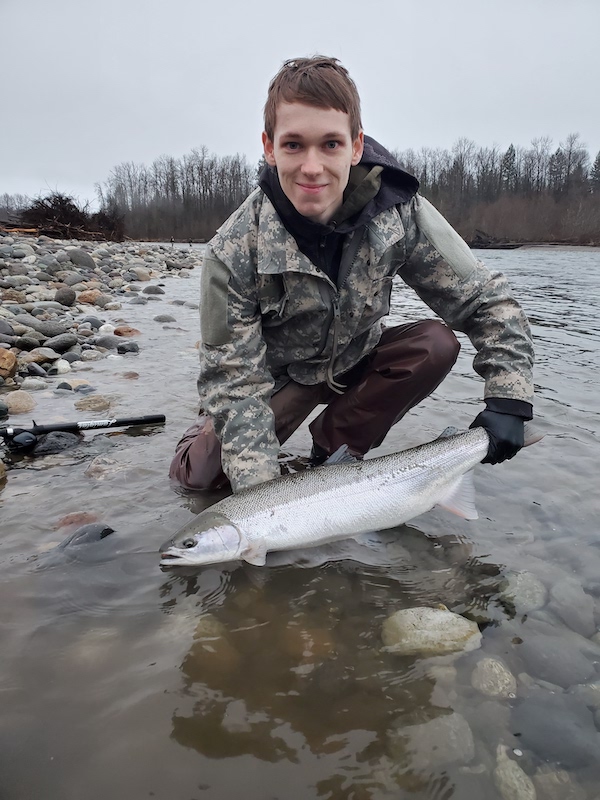
Skagit, Sauk To Open February 3 For Wild Steelhead
THE FOLLOWING IS A PRESS RELEASE FROM THE WASHINGTON DEPARTMENT OF FISH AND WILDLIFE
Fisheries managers with the Washington Department of Fish and Wildlife (WDFW) and Skagit co-managing tribes have forecasted that 5,215 wild steelhead will return to the Skagit River and its tributaries this year.

Under a management plan approved last spring, this steelhead forecast is sufficient to sustain a state-managed recreational catch and release fishery and modest steelhead fisheries operated by the Swinomish Indian Tribal Community, the Upper Skagit Indian Tribe, and the Sauk-Suiattle Indian Tribe.
Recreational steelhead fishing will open Feb. 3 through April 17 five days per week Saturdays through Wednesdays only, closed Thursdays and Fridays, on portions of the Skagit and its major tributary the Sauk under catch and release regulations, except up to two hatchery steelhead may be retained. Wild steelhead must be released immediately and may not be removed from the water. Fishing for all other species—including targeting bull trout—remains closed during this fishery.
Steelhead are a sea-going rainbow trout that can exceed 30 pounds, the Washington State Fish, and an icon of the Pacific Northwest that has been a source of important cultural and economic benefits throughout the region’s history.
“Fishing for steelhead is part of both tribal and non-tribal culture in Washington state,” said Edward Eleazer, WDFW’s North Puget Sound Region Fish Program Manager. “This fishery is a model for co-management, and as one component of WDFW’s Quicksilver Portfolio for Restoring Puget Sound Steelhead and Fisheries, for managing steelhead guided by science and careful monitoring.”
“We ask recreational anglers to give tribal fishers space and respect if they encounter each other on the Skagit or Sauk during this fishery,” said Eleazer.
On the Skagit River, steelhead fishing will be allowed from the Dalles Bridge at Concrete upstream to Cascade River Road (Marblemount Bridge). On the Sauk River, steelhead fishing will be open from the mouth upstream to Darrington Bridge (Sauk Prairie Road). See the emergency fishing rule change for additional details, including a prohibition on fishing from boats while under motor power on the Skagit, and fishing from a boat with a motor attached on the Sauk.
In 2007, steelhead in the Puget Sound Distinct Population Segment (DPS)—including wild fish returning to the Skagit—were listed as threatened under the federal Endangered Species Act (ESA).
The 10-year Skagit River Steelhead Fishery Resource Management Plan (RMP) approved in March 2023 allows state and tribal co-managers to operate steelhead-directed fisheries with stringent guidelines, monitoring and catch sampling, and enforcement. The plan was approved by the National Marine Fisheries Service (NOAA Fisheries) and was reviewed by the U.S. Fish and Wildlife Service during ESA consultation. The RMP is available on this NOAA Fisheries webpage.
During the 2024 season, fish biologists with WDFW and co-manager tribes will also conduct in-season monitoring including creel sampling and test fisheries—as well as extracting scale samples and genetic data—to improve our understanding of the Skagit steelhead population and inform future fishery management.
While steelhead are sometimes known as a “fish of a thousand casts,” fishing for them does not require a boat or expensive gear, making it a relatively accessible fishery. The Skagit Basin holds venerable status among steelheaders as the birthplace of several fishing techniques used by both gear and fly anglers.
Steelhead are also an important indicator of ecosystem health. Unlike salmon, steelhead can survive spawning and return to spawn more than once. They spend a significant portion of their juvenile and adult life stages in freshwater, making them particularly susceptible to habitat degradation and other pressures.
Anglers are reminded that the new fishing license year begins on April 1, 2024.
